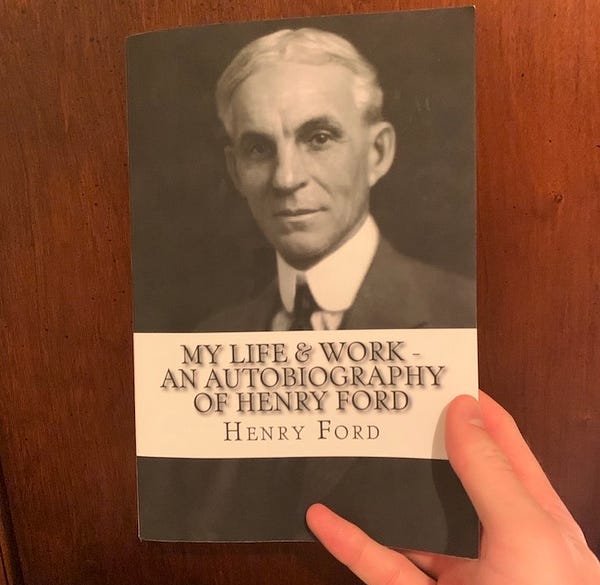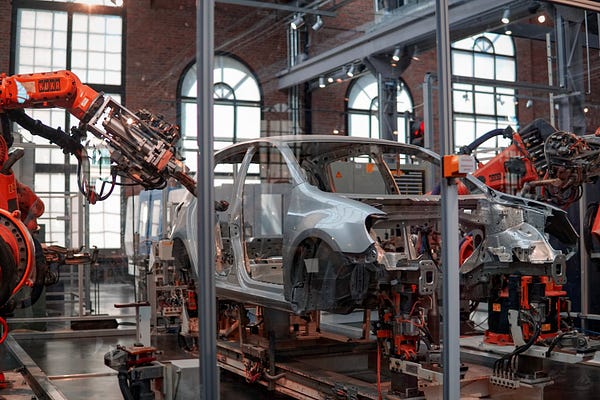My Life and Work by Henry Ford

Henry Ford is someone that I have admired for as long as I can remember. I was familiar with his quote, “You can have a car in whatever color you want as long as it’s black.” My grandfather also is a great fan of Ford and only drives Ford — nothing else. This was a book that I was very excited to get my hands on. Yet, maybe it was the publisher I chose but this book was incredibly dense. The print was ridiculous and words were from top to bottom… and there were no page numbers (I wrote them in by hand). Nonetheless, this was one of my favorite and most impactful books. Nearly 100 years later and everything within this book can be applied today, I loved it.
The beginning of the book revealed some of the processes that Henry Ford undertook when thinking about if things could be improved from their current state. I think that this is a great way to begin. What is the current state? What could be done better? What could be more efficient? Etc. It showed me so much right away about the mind that Henry Ford had.
Pg. 9, First we ought to find whether it is as well made as it should be — does it give the best possible service? Then — are the materials the best or merely the most expensive? Then — can its complexity and weight be cut down? And so on.
This made me pause after reading as it started to make complete sense. If someone is so well-versed in one area they are likely to know just how far they think they can go — and then stop.
Pg. 18, That is the way with wise people- they are so wise and practical that they always know to a dot just why something cannot be done; they always know the limitations. That is why I never employ an expert in full bloom.
There were two things that spoke to me on this page. The first being that Henry Ford said he was ALWAYS CERTAIN of results. He was not fairly confident in results. He was not optimistic about his results. He was ALWAYS CERTAIN.
Beyond that, his wife was even more confident than he. How can someone be more confident than the person who is always certain of their results? Wow. That’s a great partner though. If your partner is not pushing you to higher levels, what are they doing?
Pg. 20, I cannot say that it was hard work. No work with interest is ever hard. I always am certain of results. They always come if you work hard enough. But it was a great thing to have my wife even more confident than I was. She has always been that way.
I agree with everything he says below. Leisure and work produce different fruits. That’s always the truth. They’re always different.
Pg. 30, The man who has the largest capacity for work and thought is the man who is bound to succeed. I cannot pretend to say, because I do not know, whether the man who works always, who never leaves his business, who is absolutely intent upon getting ahead, and who therefore does get ahead — is happier than the man who keeps office hours, both for his brain and his hands. It is not necessary for any one to decide the question. A ten-horsepower engine will not pull as much as a twenty. The man who keeps brain office hours limits his horsepower. If he is satisfied to pull only the load that he has, well and good, that is his affair — but he must not complain if another who has increased his horsepower pulls more than he does. Leisure and work bring different results. If a man wants leisure and gets it — then he has no cause to complain. But he cannot have both leisure and the results of work.
This was when there was news reported that Ford was in financial trouble. They offered to give people a bond from Ford. Yet, barely anyone asked for it and Mr. Ford shared that their sales were much much higher than the prior year.
Pg. 42, We thought that the bond would give assurance to the buyers — that they needed confidence. They did not. We sold more than eighteen thousand cars — nearly double the output of the previous year — and I think that about fifty buyers asked for bonds — perhaps it was less than that.
This was a great revelation that Henry Ford had when discussing the design and layout of a factory and the organization of various aspects of it. Saving motion and energy increases efficiency and lowers costs.
Pg. 52, Getting along with the old-style architecture costs the five-story man the income of twenty-five floors. Save ten steps a day for each of twelve thousand employees and you will have saved fifty miles of wasted motion and misspent energy.
I agree. I always seek the best in people and know that it just takes the right person — and God — to lead them in a better direction. We just need to trust first. Trust — but verify.
Pg. 64, I think, on the contrary, he is, if given a chance, very likely to make a special effort to keep out of jail.
I again, agree. If the company achieves a surplus in its margin, it is only fair to give at least a portion of that to its employees.
Pg. 81, Wages and salaries are a sort of profit-sharing fixed in advance, but it often happens that when the business of the year is closed, it is discovered that more can be paid. And then more ought to be paid.
Again, I agree. I think that this is a very point. The cost of living is not something that will remain the same over time. Over time, it is only right that the cost of living will change and of course, people will all have different amounts needed for their lifestyle.
Pg. 82, The cost of living is a result and we cannot expect to keep a result constant if we keep altering the factors which produce the result. And, anyhow, who is competent to say just what kind of living we shall base the costs on?

In the same way that the automobile industry has changed, Henry Ford shared that the shoemaking industry has changed. People in today’s world often have more than just one car. In the early times of automobile production, a car was a great luxury. In the modern United States, it is often looked at as a necessity.
Pg. 103, We mentioned many machines and many methods that displaced great numbers of men and then someone asks: “Yes, that is a very fine idea from the standpoint of the proprietor, but how about these poor fellows whose jobs are taken away from them?”
The coming of shoe-machinery closed most of the shops of those who made shoes by hand. When shoes were made by hand, only the well-to-do could own more than a single pair of shoes, and most working people went barefooted in summer. Now, hardly anyone has only one pair of shoes and shoemaking is a great industry.
I love the way that Henry Ford expressed this. Profits do belong in three places, without a doubt. This was one of the most important takeaways from the book for me.
Pg. 110, Profits belong in three places: they belong to the business — to keep it steady, progressive, and sound. They belong to the men who helped produce them. And they belong also, in part, to the public. A successful business is profitable to all three of these interests — planner, producer, and purchaser.
This is a great rule, and definitely an important one when the customer is the priority. Henry Ford could have easily kept those extra workers but, doing so would have inflated the price of the car over time. As a result of the application of this rule, they now employed merely nine people per car. That’s impressive.
Pg. 117, We sold off the useless stuff. Before we had employed fifteen men per car per day. Afterward, we employed nine per car per day. This did not mean that six out of fifteen men lost their jobs. They only ceased being unproductive. We made that cut by applying the rule that everything and everybody must produce or get out.
I agree with this, the government is not going to be a major customer of most companies or organizations and can solely remove obstructions that will help companies attain greater success.
Pg. 124, The government, because it is essentially negative, cannot give positive aid to any really constructive program. It can give negative aid — by removing obstructions to progress and by ceasing to be a burden upon the community.
Truth. This is what I believe. What is the deeper drive? WHY are we scared? While everyone is called to do different things and some are called to be on the ground and feed the hungry, others are visionaries and are called to make hunger impossible. Neither is greater than the other and I believe that both must coexist.
Pg. 139, If human sympathy prompts us to feed the hungry, why should it not give the larger desire — to make hunger in our midst impossible? If we have sympathy enough for people to help them out of their troubles, surely we ought to have sympathy enough to keep them out.

Relentlessness. Stick-toit-iveness. Grit. Whatever you want to call it, it separates the great from the unforgettable and unstoppable. I’d read Tim Grover’s book, Relentless and loved that, I’d recommend that to anyone who’s looking to grow in this area as well as Angela Duckworth’s book, Grit.
Pg. 148, More men are beaten than fail. It is not wisdom they need or money, or brilliance, or “pull,” but just plain gristle and bone. This rude, simple, primitive power which we call “stick-toit-iveness” is the uncrowned king of the world of endeavor.
This isn’t the most compassionate thing and I’ve been called out multiple times for this. “Show more compassion Harrison!” they say. I mean yes, but I can speak compassionately and send the same message. No excuses. Present-day coddling? Participation trophies — and I know that Gary Vaynerchuk, amongst many others, would agree.
Pg. 149, Let every American become steeled against coddling. Americans ought to resent coddling. It is a drug. Stand up and stand out; let weaklings take charity.
Henry Ford had the great pleasure of meeting Thomas Edison and this interaction was incredible. I loved observing the comments that Ford had after spending time in the presence of Edison. A few things caught my attention. Step by step. Not with haste, not in a hurry, not quickly — but step by step. Also, he knew that we can overcome the impossible.
Pg. 158, Such was my first meeting with Edison:
His knowledge is almost universal. He is interested in every conceivable subject and he recognizes no limitations. He believes that all things are possible. At the same time, he keeps his feet on the ground. He goes forward step by step. He regards “impossible” as a description for that which we have not at the moment the knowledge to achieve. He knows that as we amass knowledge we build the power to overcome the impossible. That is the rational way of doing the “impossible.” The irrational way is to make the attempt without the toil of accumulating knowledge. Mr. Edison is only approaching the height of his power. He is the man who is going to show us what chemistry can really do.
Thinking is what matters. We can all memorize things that already happened but if we cannot think about that might affect the future, it’s all for nothing, isn’t it?
Pg. 167, The object of education is not to fill a man’s mind with facts; it is to teach him how to use his mind in thinking. And it often happens that a man can think better if he is not hampered by the knowledge of the past.

I love this. Becoming a master. It’s so important that we achieve our full potential in all that God calls us to do and the only way to do that is to become a master of our sphere.
Pg. 168, When a man is master of his own sphere, whatever it may be, he has won his degree — he has entered the realm of wisdom.
I wish more companies paid attention to this very important principle.
Pg. 174, The unfit employer causes more trouble than the unfit employee. You can change the latter to another more suitable job. But the former must usually be left to the law of compensation.
TRUTH. If you can only do work when the conditions you really are not going to be able to do too much of great value. How could you? I thought that there was so much value and importance on this page that I feel as though I highlighted the entire page.
Pg. 178, I pity the poor fellow who is so soft and flabby that he must always have, “an atmosphere of good feeling,” around him before he can do his work. There are such men. And in the end, unless they obtain enough mental and moral hardiness to lift them out of their soft reliance on “feeling,” they are failures.
There is altogether too much reliance on good feelings in our business organizations. People have too great a fondness for working with the people they like. In the end, it spoils a good many valuable qualities.
Do not misunderstand me; when I use the term “good feeling” I mean that habit of making one’s personal likes and dislikes the sole standard of judgment. Suppose you do not like a man. Is that anything against him? It may be something against you. What have your likes or dislikes to do with the facts? Every man of common sense knows that there are men whom he dislikes, who are really more capable than he is himself.
Finally, I finished the book with a great thought that reminded me of our great God. With God, we can do all things. Everything is possible with God.
Pg. 188, Everything is possible… “faith is the substance of things hoped for, the evidence of things not seen.”

This book was more than I could have ever imagined it would be. I only have more respect for Henry Ford after reading this autobiography. All the principles and points of value that can be applied to business today were wonderful to revisit and learn. I think that it says a lot about the man that Henry Ford was and his wisdom that so much of the book can be relevant 100 years later.
I gave this book a 4.5/5